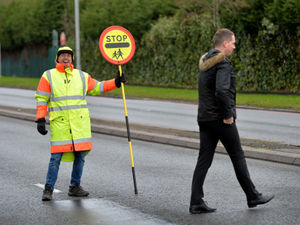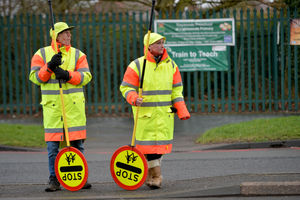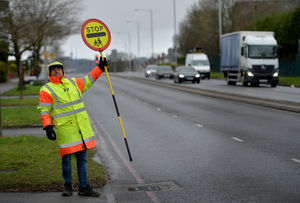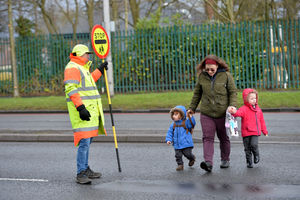Crossing patrol: The rise and fall of lollipop men and women
For generations they have been a friendly face helping schoolchildren to cross the road safely.

With their luminous jackets and giant ‘lollipops’ crossing patrol wardens are a welcome sight outside many of the region’s primary schools.
In recent years, however, they have become rarer in some parts of the country as numbers have fallen as councils look to save cash.
Nationally there are around 2,000 fewer lollipop men and women, as they are fondly known, compared with a decade ago.
But in the Black Country and Staffordshire hundreds are still on duty every week day helping pupils and their families cross busy roads.
History
It’s a role that has a long history as the first lollipop lady was Mary Hunt, a school caretaker who began work helping pupils in Bath get to lessons on September 21, 1937.
The outbreak of the Second World War put paid to a nationwide scheme so it wasn’t until the early 1950s when patrols were more widely adopted.
Two of Britain’s first road safety officers – Dorothy Pummell in Barking and Jock Brining in Dagenham – began recruiting ‘active retired gentlemen’ to help school children cross the road, issuing the men with a lollipop, white coats, yellow armbands, and peaked caps.

Other boroughs followed suit and the patrols were recognised officially with the introduction of The School Crossing Patrol Service as part of The London Traffic (Children Crossing Traffic Notices) Law of 1952.
The Act allowed any person authorised by the Commissioner of the Metropolitan Police, using the prescribed traffic sign, to stop traffic in order to allow children to cross. Traffic had to stop before reaching the patrol or be fined £5. The 1953 School Crossing Patrol Act extended the idea nationally. Since then patrols have been granted the right to stop traffic and to escort adult pedestrians across the road as well as children.
The first stop signs on a pole were black-and-white rectangles; the round sign, immediately dubbed the lollipop, was introduced in the 1960s.
In 2000, a change in law meant crossing patrols were no longer a legal requirement for schools, which led to a reduction in numbers nationally.

According to the latest figures issued by the GMB union, there were 7,128 employed by councils across England, Scotland and Wales in 2009/10 and by 2017/18 that had dropped to 5,047.
The West Midlands and the North West were the worst-hit regions, with drops of 386 and 378 respectively, while Wales had 250 fewer school crossing patrol officers, with Scotland losing 163
But for the men and women who still carry out this important role each week it’ remains a rewarding job.
Helping the community
Pete Burling has been on duty near The Wernley pub on the A4123 Wolverhampton Road in Oldbury for almost eight years.
He is there every weekday morning, lunchtime and afternoon ready to assist youngsters making their way to Lightwoods Primary School and nearby nurseries.
Mornings and afternoons are the busiest times and will see him cross the road countless times between 8.30am and 9.15 and 3.10pm and 4pm.

Mr Burling, who previously worked for Sandwell Council for 35 years in the repairs service as a plumber, says the children are always pleased to see him and some even being him small gifts throughout the year and at Christmas.
“I enjoy being out in the open air and interacting with the community. I get to see the children grow up and I know I’m helping the community,” said the 66-year-old, who is on duty rain or shine.
He knows more than most how vital the role is after being knocked down on the same road he now patrols when he was 11-years-old.
Mr Burling, who broke both legs and was left in a coma for weeks following the accident, said: “There is more traffic now than there was back than. Doing this job has really opened my eyes to how dangerous it can be for children trying to cross the road so it’s good to be making it safer for them.”
The role does require him to have a thick skin at times when facing drivers who refuse to stop for the lollipop.
“Nine times out of 10 drivers are respectful and stop but on the odd occasion you get someone who takes no notice of the sign. You can’t do anything about that,” said Mr Burling, who still cycles to his post every morning and is one of 53 crossing patrol wardens in Sandwell.
School crossing patrols are highly regarded by schools and parents and this was demonstrated in Staffordshire just last year.
The county council was proposing cutting funding for lollipop patrols in some areas as part of its upcoming budget However, following a backlash from parents, including a petition signed by more than 7,000 people, council bosses decided to carry on providing the service.





